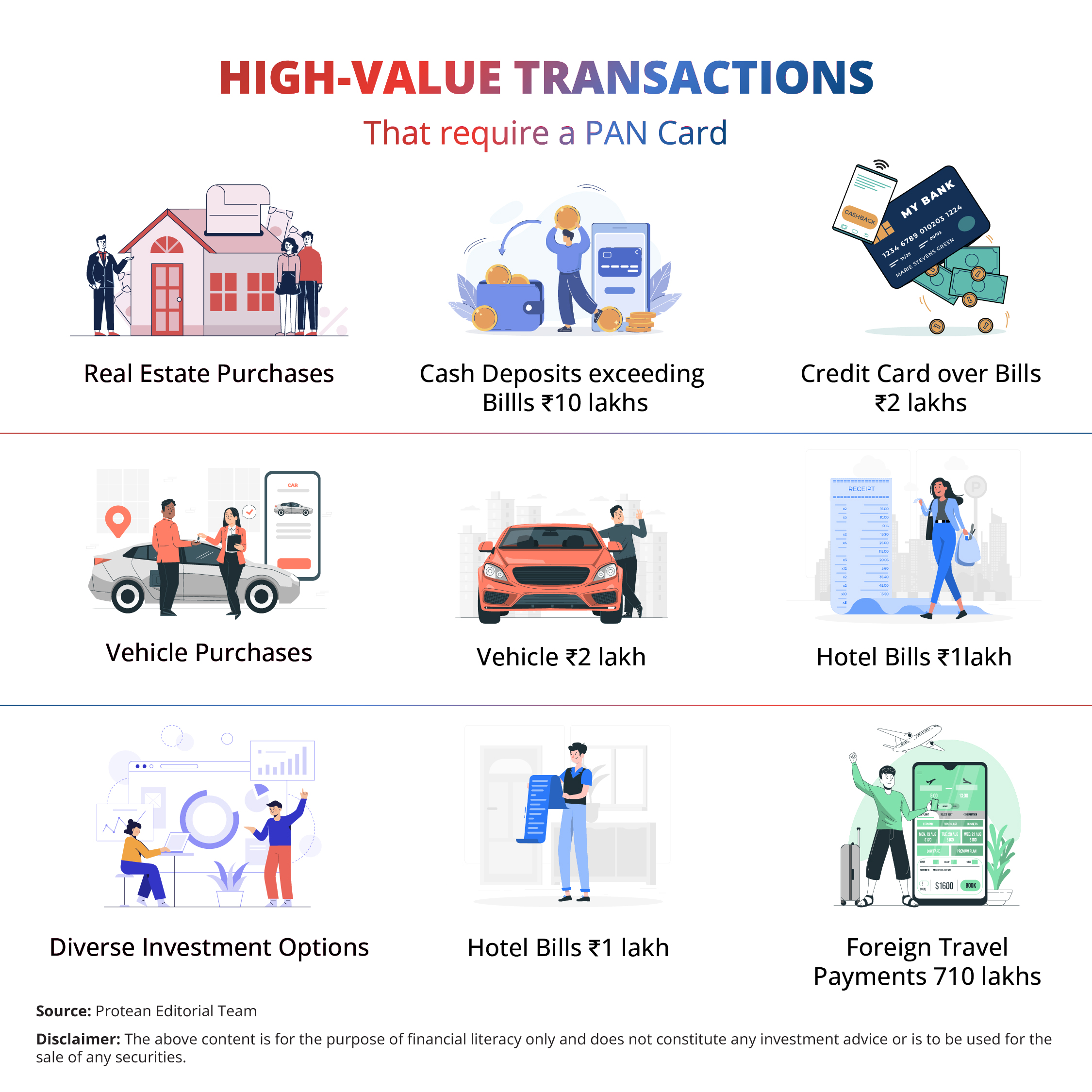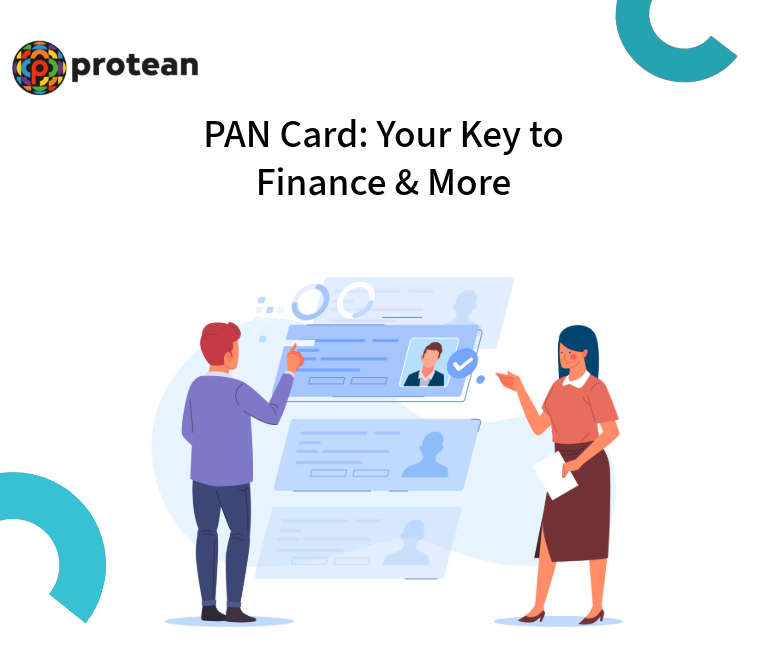PAN card uses extend beyond being a mere tax nitty gritty.
PAN (Permanent Account Number) cards can come to use in cases like filing income tax returns, opening a bank account and more. While these are its most visible functions, the PAN card can play a far bigger role in shaping our financial and transactional footprint.
What many do not realise is that the PAN card has quietly become a central requirement across various sectors in India. You need it for purposes like investments to real estate, availing certain government benefits and most importantly, determining one’s financial identity. Let us discuss a few surprising PAN card uses that every Indian should be aware of.
| Click here to know more about PAN services. |
Beyond Taxes and Banking: Unveiling the Unexpected
The PAN card is no longer just a tax-related necessity. It is a multi-utility identity document embedded deeply in India’s evolving financial ecosystem. From regulatory compliance to transparency in financial dealings, the government now uses PAN to monitor and link various high-value and identity-sensitive transactions.
PAN card is essential in opening a Demat account, making high-value purchases, and even availing certain government schemes. So, if you thought your PAN was just a tax ID, prepare to be surprised.

| Click here to learn about PAN card uses for loan and credit card application. |
Entering the World of Investments: Opening a Demat & Trading Account
A Demat (Dematerialised) account is essential for anyone looking to invest in the stock market, mutual funds, exchange-traded funds (ETFs), bonds, or debentures. It is the digital repository where your securities are held in electronic form.
What many do not realise is that a PAN card is mandatory for opening a Demat account with any SEBI-registered Depository Participant (DP). This is not optional, even joint Demat accounts require the PAN of each holder.
So, why is it required?
PAN would help regulators (like RBI and SEBI) track financial transactions, prevent multiple account misuse, and ensure that investment gains are correctly linked to your income profile for taxation and compliance purposes.
Without PAN, your entry into capital markets is simply not possible.
| Learn about the role of PAN in unlocking your digital future here. |
Navigating High-Value Transactions: Keeping Track of Big Money
The government uses PAN as a tracking tool to prevent tax evasion and illicit financial activities. Hence, quoting PAN is mandatory for various high-value transactions, such as:
- Purchase or sale of immovable property exceeding ₹10 lakh.
- Cash deposits exceeding ₹50,000 in a single day or fixed deposits above ₹50,000.
- Credit card bill payments exceeding ₹50,000 in cash at one time.
- Purchase or sale of a motor vehicle (excluding two-wheelers).
- Investments in debentures, bonds, mutual funds, or shares above ₹50,000.
- Hotel or restaurant bills exceeding ₹50,000 in cash.
- Foreign travel payments or remittances exceeding ₹50,000 in one go.
These regulations, under Rule 114B of the Income Tax Rules, can ensure that large sums of money are traceable. The PAN card acts as a financial fingerprint, tying significant transactions to your tax identity.
Even if you are not a regular investor, these situations can crop up in everyday life, making your PAN card indispensable.
| A PAN card is essential, even for a Minor! Check this link to know about PAN for Minor benefits. |
Unlocking Government Benefits: Accessing Certain Schemes
The following major government schemes and subsidies require PAN details for authentication, particularly when financial disbursements are involved:
- PM-KISAN Samman Nidhi Yojana: PAN is often needed to verify landholder records.
- Startup India and Mudra Loan Schemes: PAN is a prerequisite for identity and financial credibility checks.
- Subsidised LPG connections (under PAHAL): PAN may be required when Aadhaar is not linked.
- NSDL services for pensioners and senior citizens sometimes mandate PAN for getting digital life certificates or for scheme-related verifications.
The government’s aim is to link benefits with genuine and traceable individuals, reducing duplication, fraud, and leakage.
Other Surprising PAN Card Uses
There are several other unexpected PAN card requirements that people often overlook:
- Form 60/61 Requirements: If you do not have a PAN, you must submit Form 60 when engaging in high-value transactions (like buying property, opening accounts, and more). This can be tedious and may lead to your application being delayed or rejected. Not having a PAN can also make you invisible in the formal economy, with no record of your finances.
- Driving and Professional Licenses: Some regional transport offices (RTOs) ask for PAN during issuance of commercial driving licenses or when applying for professional registrations.
- Loan Guarantor: Acting as a loan guarantor for someone requires PAN submission for KYC and financial verification.
- Online Payments and Registrations: Certain high-value e-commerce transactions, domain purchases, or subscription platforms may prompt for PAN verification to comply with regulatory norms.
| These edge cases show how PAN card necessity is spreading across digital and physical infrastructures alike. Need to apply for a PAN card or update incorrect details? Visit Protean’s official PAN services page for hassle-free support. |
Conclusion
From investing in the stock market to check-in in luxury hotels, and from unlocking government benefits to acting as a loan guarantor, your PAN card uses go far beyond tax returns. In modern India, your PAN card is a financial document, helping link, track, and verify a wide array of activities across both public and private sectors.
| Click on this link now to get your PAN in just four steps. |

